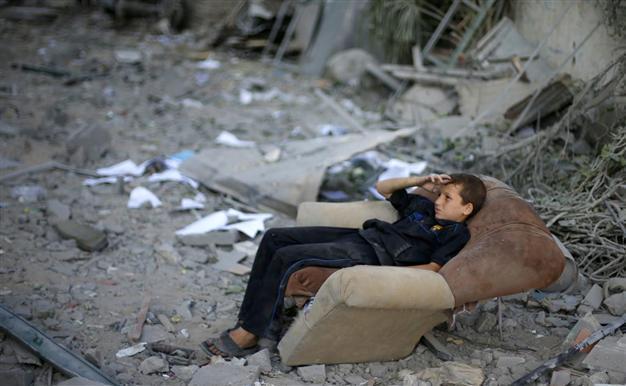Strike on UN Gaza school kills at least 10 as Israel starts troop pullout
GAZA CITY - Agence France-Presse

Palestinian boy sits on a sofa outside his family's house, which witnesses said was damaged in an Israeli air strike, in Gaza City. REUTERS Photo / Suhaib Salem
At least 10 people died in a fresh strike on a U.N. school in Gaza Aug. 3 shortly after Israel confirmed it had begun withdrawing some
troops from the war-torn enclave.
The strike on the
school sheltering displaced Palestinians in the southern city of Rafah
came as Israel pounded the region following the suspected capture of a
soldier by militants, who was later declared dead.
It
was the third time in 10 days that a U.N. school had been hit and came
four days after Israeli tank shells slammed into a school in the
northern town of Jabaliya, killing 16 in an attack furiously denounced
by U.N. chief Ban Ki-moon as "reprehensible."
An AFP
correspondent said there were scenes of chaos at the site, with rescuers
trying to evacuate the wounded any way they could, while adults were
seen sprinting frantically away through pools of blood, young children
clutched in their arms.
Chris Gunness, spokesman for the U.N.
agency for Palestinian refugees (UNRWA), said the school had been
housing thousands of internally displaced people (IDPs) who had been
forced to flee their homes by the ongoing violence in Gaza.
"Shelling
incident in vicinity of UNRWA school in Rafah sheltering almost 3,000
IDP. Initial reports say multiple deaths and injury," he wrote on his
Twitter feed.
Regional efforts to broker a diplomatic end to the
fighting between Israel and Hamas have so far proved elusive, with their
confrontation in Gaza now in its 27th day with more than 1,700 people
killed.
A Palestinian delegation was to hold truce talks Aug. 3
in Cairo with senior U.S. and Egyptian officials, but Israel has said it
sees no point in sending its negotiators to the meeting, citing what it
says are Hamas breaches of previous agreed truces.
Islamic Jihad
was also expected to join along with U.S. Middle East envoy Frank
Lowenstein. Several Israeli newspapers reported that cabinet ministers
have taken a decision not to seek a further negotiated ceasefire
agreement with Hamas and were considering ending the military operation
unilaterally.
Israel's army announced on Sunday it had
begun withdrawing some troops from Gaza with a military spokesman saying
the ground operation was "changing gear."
"We are
removing some (forces)," Lieutenant Colonel Peter Lerner told AFP,
saying troops were "extremely close" to completing a mission to destroy a
network of attack tunnels.
"We are redeploying within the Gaza
Strip, taking out other positions, and relieving other forces from
within, so it won't be the same type of ground operation," he said. "But
indeed we will continue to operate ... (and) have a rapid reaction
force on the ground that can engage Hamas if required.
"It's
changing gear but it's still ongoing." Israel's assault on the southern
city of Rafah began early on Aug. 1 in the opening hours of a 72-hour
humanitarian truce, which was quickly shattered when militants ambushed a
group of soldiers, killing two of them.
Missing soldier announced deadA
third was reported missing, believed snatched in a development which
drew sharp condemnation from top U.S. and U.N. officials.
But
early on Aug. 3, the Israeli army formally announced the death the
soldier, 23-year-old Hadar Goldin, saying he had been "killed in battle
in the Gaza Strip on Friday."
Army radio said no body had been
recovered, rendering the decision to announce his death "very delicate."
There was no word on the whereabouts of his remains.
Hamas's
Ezzedine al-Qassam Brigades acknowledged its militants had staged an
ambush in which two other Israeli soldiers were killed, but denied
holding Goldin.
His death raised to 64 the total number of
soldiers killed since the start of the operation to July 8, its heaviest
toll since the Lebanon war of 2006.
Nonetheless,
Israeli Prime Minister Benjamin Netanyahu vowed to press on with the
operation, promising that Hamas would pay "an insufferable price" for
continued cross-border rocket fire.
"We will take as much time
as necessary, and will exert as much force as needed," he said late on
Saturday, saying troops would complete their mission to destroy the
tunnels after which the next security objectives would be decided.
His remarks came after the army gave a first indication it
was ending operations in parts of Gaza, informing residents of Beit
Lahiya and Al-Atatra in the north that it was "safe" to return home.
Witnesses
in the north confirmed seeing troops leaving the area as others were
seen pulling out of villages east of Khan Yunis in the south as
commentators suggested it was the start of a unilateral withdrawal.
